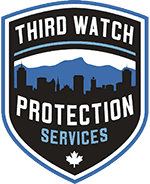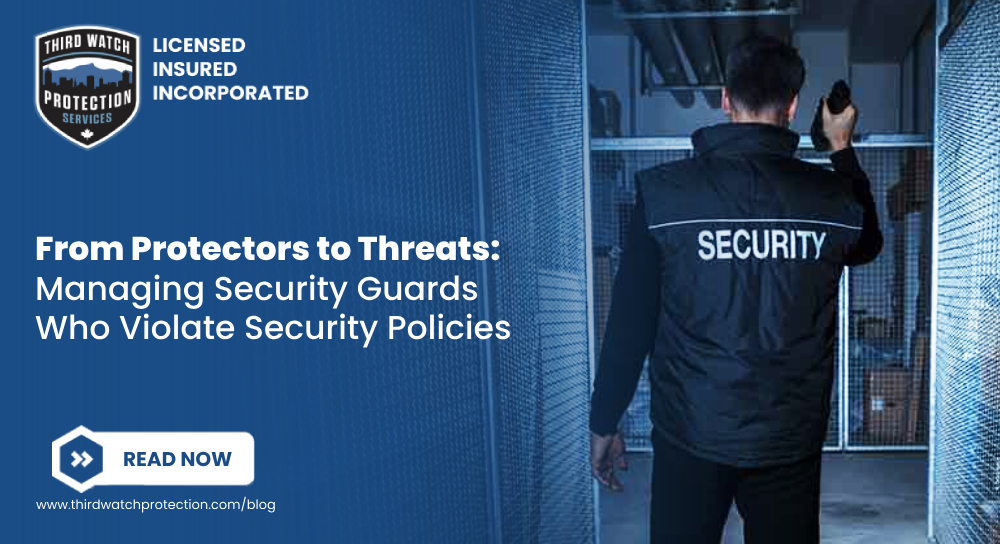From Protectors to Threats: Managing Security Guards Who Violate Security Policies
In the realm of security management, security guards are often viewed as the frontline protectors of property, personnel, and information. Their role is to deter crime, respond to incidents, and ensure a safe environment for the public and employees alike. However, what happens when those entrusted with security become the very threats they were hired to protect against? In Ontario, the issue of security guards violating security policies is an alarming reality that organizations must address diligently. In this blog post, we will explore the factors that lead to such violations, their implications, and strategies for effective management of security personnel.
Understanding the Problem
The Role of Security Guards: Security guards play a multifaceted role in ensuring safety and order. They are responsible for monitoring surroundings, conducting inspections, responding to alarms, and interacting with the public. Ideally, they act as the first line of defense against crime and emergencies, instilling a sense of security among employees and visitors alike. However, the vast responsibilities carried by these professionals can sometimes lead to lapses in judgment or, worse, intentional misconduct.
The Nature of Violations: Violations can range from minor breaches of protocol, like failing to report an incident or neglecting routine patrols, to severe infractions such as theft, abuse of power, or collusion with criminal activities. Factors such as inadequate training, poor supervision, burnout, and a lack of adherence to security protocols can contribute to these violations. It is troubling to note that sometimes, guards may misuse the authority granted to them, undermining trust and safety.
Implications of Policy Violations
Organizational Risks: Allowing security guards to operate outside the parameters of established policies can put an organization at significant risk. Here are some of the potential fallout from such violations:
- Legal Liabilities: Organizations can face legal action if guards engage in misconduct, leading to wrongful arrests, violations of privacy, or excessive use of force.
- Reputational Damage: The trust that the public and employees place in a security team is vital. Incidents of unethical behavior can severely damage an organization’s reputation, leading to a loss of clientele and decreased employee morale.
- Increased Crime Rates: A security team that is not adequately managed can lead to an increase in criminal behavior, as vulnerabilities in security protocols become evident.
Impact on Team Dynamics
Excessive or inappropriate conduct by security personnel can also have a detrimental effect on team dynamics. When tensions arise between guards—whether due to competition, distrust, or allegations of misconduct—overall morale plummets. This can lead to a breakdown in communication and collaboration essential for maintaining an effective security presence.
Strategies for Managing Violations
Given the implications of security guards violating policies, organizations need proactive management strategies to mitigate risks associated with these violations. Here are several key approaches:
- Comprehensive Training and Certification: Robust training programs must be established to ensure all security personnel are well-versed in company policies, legal obligations, and ethical practices. Furthermore, ongoing training and refresher courses can help keep guards up-to-date with industry standards and best practices. This continuous investment in training can also serve to empower guards with a sense of professionalism.
- Transparent Hiring Processes: Initiating thorough background checks during the hiring process can help to filter out potential security risks. By validating prior experience, assessing character, and conducting interviews that reveal candidates’ values and ethics, organizations can select guards who are more likely to adhere to established policies.
- Effective Supervision and Accountability: To maintain a strong security presence, proper supervision is essential. This can involve deploying more experienced guards to mentor newcomers, implementing regular performance evaluations, and establishing a chain of command where violations can be reported and addressed. Implementing a clear disciplinary process establishes accountability and assures staff that violations will not go unnoticed.
- Utilize Technology for Transparency: Advancements in technology provide organizations with various tools to monitor guard activity. Cameras, GPS tracking, and incident reporting software can supply real-time data regarding security operations. This not only enhances monitoring but also allows for timely intervention if something appears amiss.
- Foster a Supportive Work Culture: Creating an environment of support and respect can significantly impact a guard’s job satisfaction and motivation to adhere to policies. It’s critical that security personnel feel valued and heard. Regularly gathering feedback, providing opportunities for growth, and recognizing exemplary performance can foster a positive workplace culture that mitigates the risk of policy violations.
- Establish Clear Policies and Consequences: All security personnel should have access to a codified set of policies and procedures. Ensuring that protocols are clear, accessible, and frequently communicated can mitigate confusion or ambiguity about expected behavior. It’s vital to also outline the consequences of violating those policies consistently.
In Conclusion
The transition from protector to threat is a paradigm that demands attention from organizations employing security guards in Ontario. By recognizing the root causes of policy violations and implementing targeted management strategies, organizations can thwart potential misconduct before it occurs. Through continuous training, clear communication, effective supervision, and a supportive workplace culture, we can transform our security personnel back into the protectors they are meant to be—guardians of safety and trust in our communities. A proactive stance on this issue will not only enhance security but also foster a sense of safety and confidence within workplaces, giving everyone the assurance they deserve.
If you are interested in a new security provider, Third Watch Protection Services is here to help protect your property. Call us today at 1-888-444-5232 or email mail@thirdwatchprotection.com. Let’s get started!



